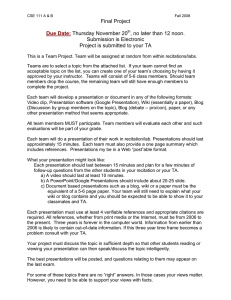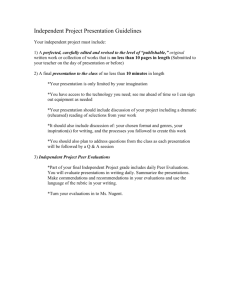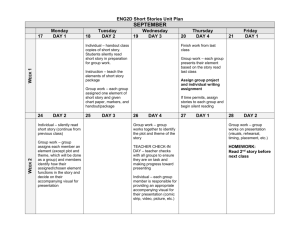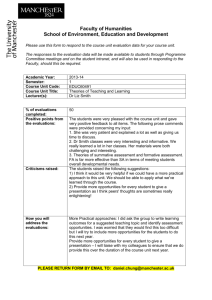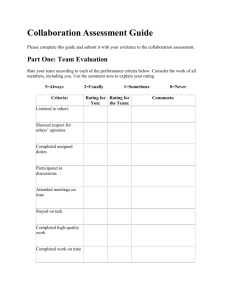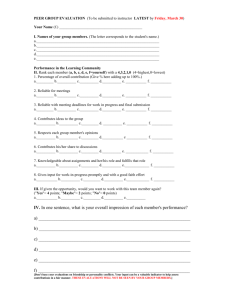Final Project Monday April 20, 2009, no later than 8am.
advertisement
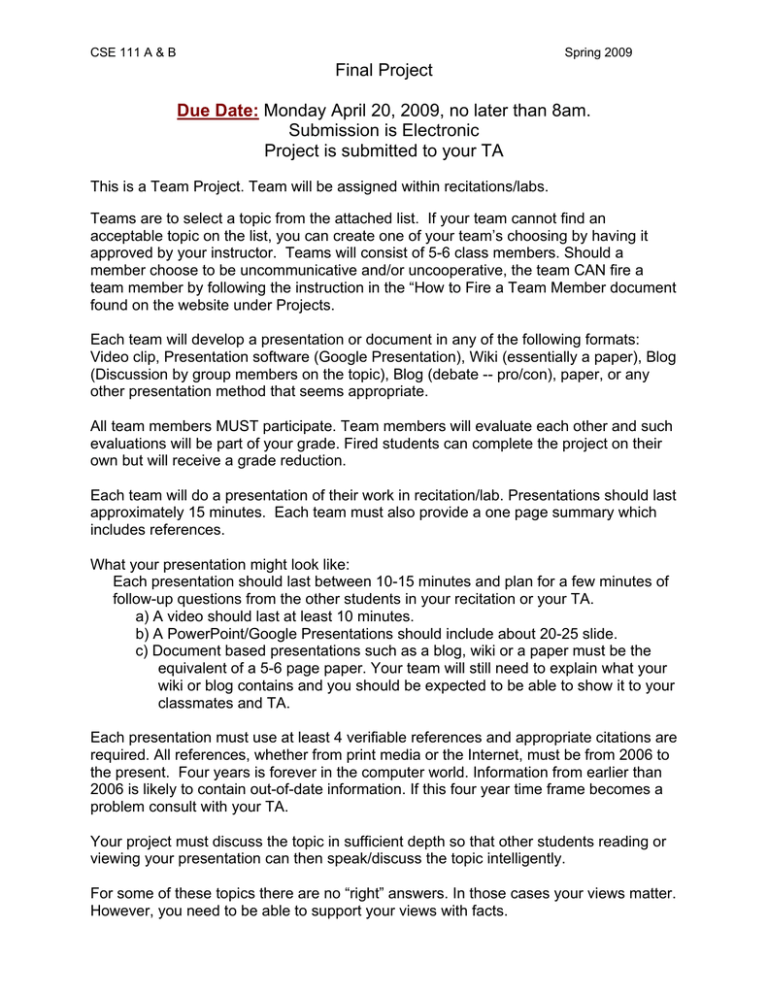
CSE 111 A & B Spring 2009 Final Project Due Date: Monday April 20, 2009, no later than 8am. Submission is Electronic Project is submitted to your TA This is a Team Project. Team will be assigned within recitations/labs. Teams are to select a topic from the attached list. If your team cannot find an acceptable topic on the list, you can create one of your team’s choosing by having it approved by your instructor. Teams will consist of 5-6 class members. Should a member choose to be uncommunicative and/or uncooperative, the team CAN fire a team member by following the instruction in the “How to Fire a Team Member document found on the website under Projects. Each team will develop a presentation or document in any of the following formats: Video clip, Presentation software (Google Presentation), Wiki (essentially a paper), Blog (Discussion by group members on the topic), Blog (debate -- pro/con), paper, or any other presentation method that seems appropriate. All team members MUST participate. Team members will evaluate each other and such evaluations will be part of your grade. Fired students can complete the project on their own but will receive a grade reduction. Each team will do a presentation of their work in recitation/lab. Presentations should last approximately 15 minutes. Each team must also provide a one page summary which includes references. What your presentation might look like: Each presentation should last between 10-15 minutes and plan for a few minutes of follow-up questions from the other students in your recitation or your TA. a) A video should last at least 10 minutes. b) A PowerPoint/Google Presentations should include about 20-25 slide. c) Document based presentations such as a blog, wiki or a paper must be the equivalent of a 5-6 page paper. Your team will still need to explain what your wiki or blog contains and you should be expected to be able to show it to your classmates and TA. Each presentation must use at least 4 verifiable references and appropriate citations are required. All references, whether from print media or the Internet, must be from 2006 to the present. Four years is forever in the computer world. Information from earlier than 2006 is likely to contain out-of-date information. If this four year time frame becomes a problem consult with your TA. Your project must discuss the topic in sufficient depth so that other students reading or viewing your presentation can then speak/discuss the topic intelligently. For some of these topics there are no “right” answers. In those cases your views matter. However, you need to be able to support your views with facts. CSE 111 A & B Spring 2009 Final Project Projects will be graded on content, creativity, quality of presented material, and the usefulness of referenced material. Peer evaluations from your team members will also be included in your grade. All team members will receive the same base-grade. 60% of the project grade is the base-grade (everyone gets the same grade for this portion), 20% is a presentation grade (this portion reflects your participation in the presentation) and 20% is for the peer evaluations. Students who fail to show up for their team’s presentation will automatically receive a letter grade lower as their base-grade on the project regardless of their participation in the development of the project. Peer Evaluations: Each team member will evaluate every other team member, and themselves, in writing. The peer evaluations will be handed in to the TA when the project is presented in class. The form for the peer evaluations are found on the website under projects. Topic List: 1. 2. 3. 4. 5. 6. 7. 8. 9. 10. 11. 12. 13. 14. 15. 16. 17. 18. 19. 20. 21. 22. 23. 24. 25. 26. 27. 28. 29. 30. 31. $100 Laptop Project John Von Neumann Alan Turing Anonymity and Internet information Are Robots like R2D2 and C3P0 possible? Biometrics Computer animation Computer Errors Computer Ethics Computer History Computer Music Computer Piracy Computers and Censorship Computers and Data Collection issues Computers and Free Speech Computers and Medical Data issues Computers and the changing job market Computers and the Family Computers and the War on Terror Computers in Medicine Computers in Science Fiction Copyright & Computers Creating digital content, computers and art Dangers from Computer communities Digital Divide Do computers think? E-dating, good or bad? Electronic voting Email issues Encryption Fraud 32. 33. 34. 35. 36. 37. 38. 39. 40. 41. 42. 43. 44. 45. 46. 47. 48. 49. 50. 51. 52. 53. 54. 55. Game Design Government data collection Hacking Homework sites How safe are the computers and software we use? Identity Theft Information overload Internet access in China Is Google’s influence becoming too great? Is Microsoft the Evil Empire? Keeping in touch, Email, Text messaging, cell phones etc. Out-sourcing of employment Phishing Plagiarism in the digital age Robots in the Real World Software for children. Is this a good idea? SPAM The changing library Virtual Communities and Social Networking: Face book, MySpace etc. What is a Turing Machine? What is the Turing Test? Include examples What’s a Blog? How is it used? What can it contain? What’s a Wiki? How is it used? What can it contain? Why is computer gaming is so popular?
